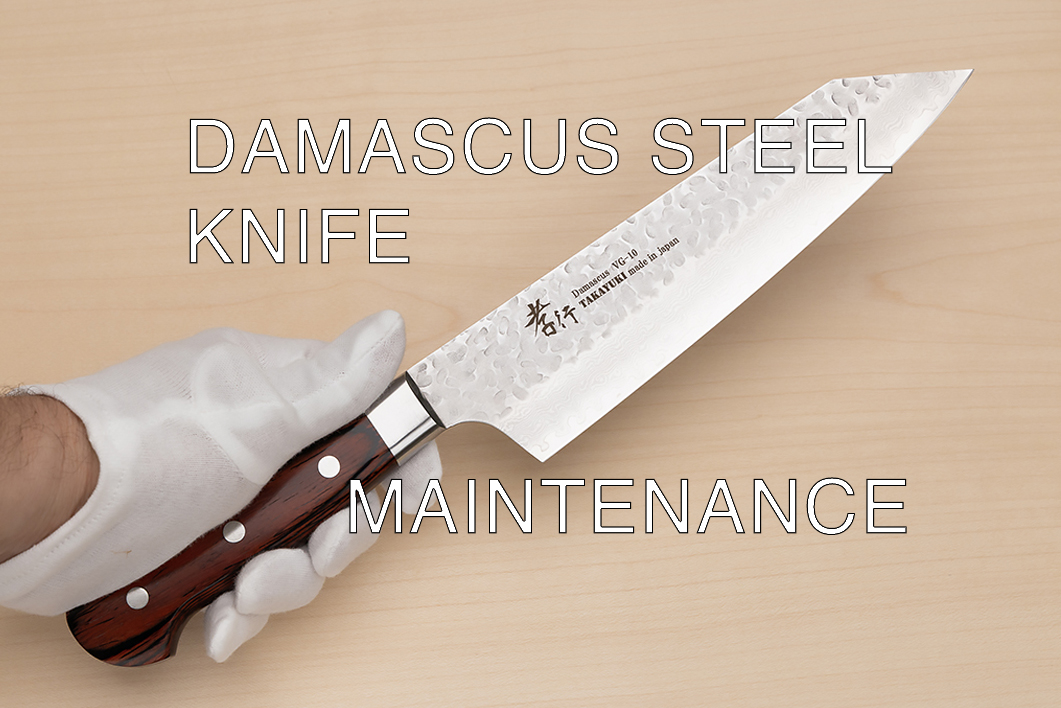Damascus steel knives are considered one of the most reliable, sharp, and durable in the world. Historically, Damascus was used to make the highest quality knives, swords, and daggers, and today kitchen knives are made from this legendary material. This steel is obtained by forging from several layers of different types of metal. As a result, an original beautiful pattern is formed on the lateral edges of the blade, and the cutting edge acquires hardness and moderate flexibility at the same time.
For the tool to serve for many years, it should be properly maintained to have an impeccable cut quality. Follow these tips:
- Lubricate the blades regularly. Damascus steel contains relatively large amounts of carbon. It gives the blade hardness, provides excellent cutting properties, and prevents premature dulling. However, this element is sensitive to moisture. A Damascus knife may develop dark spots and rusted areas on the blade if not correctly cared for it. To prevent this, you must always keep the knife clean in a dry place. After use, clean, wash by hand, and wipe thoroughly the entire tool completely - both the handle and the blade. If you rarely use a knife, you still need to treat it with a special wax periodically. Avoid heavy application of oils and wax - this will also not do the blade good. Apply in a thin layer and wipe with a dry, clean cloth. After put the knife in a drawer or other storage location. It would be best if you did not use a leather sheath for this - the substances used to process the material can negatively affect the quality of the batch steel, provoke the oxidation process. The use of a cloth or canvas sheath is recommended. Keep the knife away from sources of high humidity and temperature extremes.
- Avoid aggressive exposure. Damascus steel blade does not tolerate abrasive materials (metal brushes, for example), alkalis, and acids. Such an impact can lead to etching of the characteristic pattern on the lateral edges of the blade, as well as provoke the appearance of spots, scratches, and damage.
- Use the knife for its purpose. Damascus steel knife care is intended for intended use only. It is not recommended to use the blade for cutting acidic products (lemon, cranberry, etc.), take it with you in the field, or constantly work with it in a humid environment. This tool is also not intended to chop bones and frozen meat, open cans, or do construction work. Each type of knife has a specialization (for meat, vegetables, for fish), which must be observed.
- Observe the sharpness of the cutting edge. Damascus steel knives, when used correctly, may not need to be trimmed and sharpened for years. However, if the cutting edge is wrinkled or has lost its former sharpness, sharpening is necessary. Otherwise, additional efforts will have to be made during work, the quality of the cut may suffer. Japanese knives made of Damascus steel should be sharpened only on water stones, observing the sharpening angle specified by the manufacturer. The abrasive is soaked in water, and a suspension forms on it during sharpening. For a complete sharpening cycle, several types of stones of different grain sizes are used - for rough and final sharpening, blade polishing. An unsuitable abrasive (diamond or ceramic, for example) can remove too much steel and damage the cutting edge.
- Remove rust. If areas of corrosion have formed on the knife (due to improper long-term storage, for example), they need to be removed to prevent further spread. To do this, you can use a fine-grained water stone or sandpaper moistened with kerosene or mineral oil.
Taking care of a Damascus steel knife is not as difficult as it might seem at first glance. Most care rules and tips apply to any high-quality blade whose owner treats it with respect and the delicacy inherent in professional chefs. Such a tool surpasses the competition both in sharpness and in terms of service life and ease of operation. Damascus knife is not just a blade but a genuine artifact, the pride of any self-respecting culinary specialist. Provide the knife with full-fledged care, and it will certainly reciprocate!



Md. Mahabubul Wahid